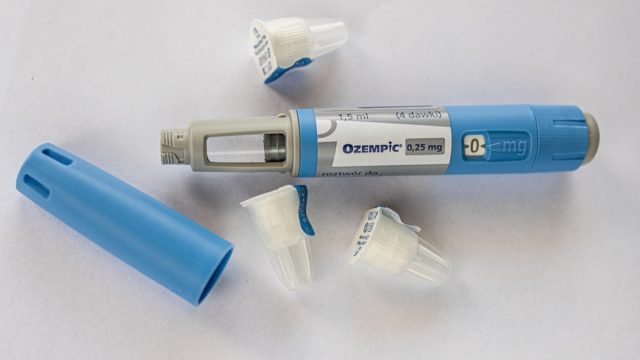How Your Eating Habits Change After You Stop Taking Ozempic, New Study Says

If you’ve heard anything about the type 2 diabetes drug Ozempic, it’s likely related to the dramatic weight loss results it’s known to produce. The medication, formally known as semaglutide, does this by mimicking the glucagon-like peptide-1 (GLP-1) hormone in the gut, effectively lowering blood glucose levels and decreasing appetite. With this approach, both Ozempic and its sister drug, Wegovy, have become life-changing for some. But like all weight-loss strategies, it’s natural to wonder what happens when you stop treatment. Now, a new Deutsche Bank survey is addressing one larger concern for those who discontinue GLP-1 medications like Ozempic: how their eating habits will change.
RELATED: Ozempic Patients Say It “Stops Working” for Weight Loss—How to Prevent That.
When people start taking GLP-1 medications like Wegovy and Ozempic—both of which are well-known options manufactured by Novo Nordisk, but far from the only GLP-1 meds on the market—calorie count declines, the survey found, per CNBC. However, when patients discontinue the medications, calorie counts go back up again, and some patients consume even more calories than they had before they started treatment.
The bank polled 600 U.S. consumers in Dec. 2023, 70 percent of whom were taking GLP-1 drugs when they responded to the survey. The other 30 percent had already stopped taking these medications.
When patients still on GLP-1s were asked about their eating habits, 30 percent reported eating “a little less,” and 22 percent said they ate “a lot less.” Also within this group, 17 percent said they were eating a lot more, while the remaining 18 percent said they were eating a little more. Researchers said these findings were surprising because it netted out to just 18 percent of those still on GLP-1s eating less than they had before starting the medication.
However, people who’d stopped taking the medication had different responses.
“Amongst those who were no longer taking GLP-1 this more than reversed with a net 30% stating that they were now eating more than they were prior to using GLP-1 medication,” the survey report said, per CNBC.
Deutsche Bank performed the survey to better understand how Ozempic and Weogvy, as well as other treatments like Eli Lilly’s Mounjaro and Zepbound, are affecting the food and beverage industry. (Mounjaro and Zepbound are the brand names for tirzepatide, which activates the GLP-1 hormone as well as the glucose-dependent insulinotropic polypeptide.)
RELATED: What Really Happens If You Stop Taking Ozempic, Doctors Say.
When it came to the overall goal of understanding food and beverage stocks, researchers said that they don’t believe GLP-1 medications are a “reason in of itself to avoid investing.” They also added that the effect of these drugs needs to be evaluated “in the context of all weight loss programs and the possibility that GLP-1 cannibalizes such programs, limiting the net effect on food and beverage producers,” CNBC reported.
Experts told CNBC that the survey results weren’t necessarily surprising, as our bodies tend to revert to a set weight when we aren’t intervening with medication or changing behaviors. But for its part, a Novo Nordisk spokesperson told Best Life that clinical trials of Wegovy have, in fact, shown that patients regain weight when they stop taking these medications—and that’s not unexpected.
“This supports the belief that obesity is a chronic disease that requires long-term management, much like high blood pressure or high cholesterol, for which most patients remain on therapy long-term in order to continue to experience the benefits of their medications,” the statement reads.
Eli Lilly had similar comments about the effectiveness of traditional approaches. In a statement to CNBC, a company spokesperson said, “We know that for some people living with obesity, diet, exercise and/or behavioral counseling often fail over the long-term, and they need more to achieve their weight goals.”
Best Life reached out to Eli Lilly for comment, and will update the story with its response.
RELATED: For more up-to-date information, sign up for our daily newsletter.
Best Life offers the most up-to-date information from top experts, new research, and health agencies, but our content is not meant to be a substitute for professional guidance. When it comes to the medication you’re taking or any other health questions you have, always consult your healthcare provider directly.